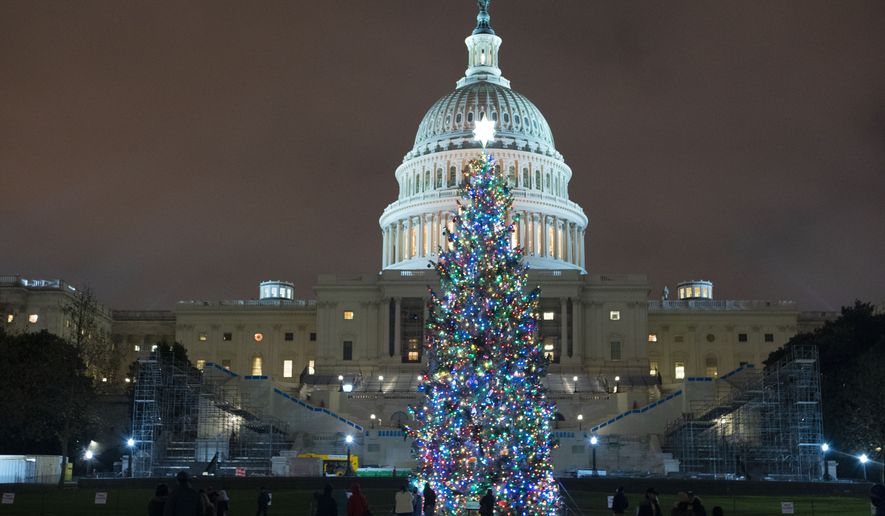Congressional leaders finalized a nearly $900 billion coronavirus relief bill Sunday night, breaking eight months of gridlock to deliver another round of stimulus checks, unemployment benefits and assistance to small businesses, as well as cash to help get new vaccines into waiting arms.
“At long last, we have the bipartisan breakthrough the country has needed,” said Senate Majority Leader Mitch McConnell, the Kentucky Republican who hashed out the final deal with the other top party leaders.
Both chambers are hoping to vote on the package Monday, and leaders are optimistic that they can deliver strong majorities in the House and Senate.
The bill is expected to be coupled with a full-year 2021 spending bill as well.
But with funding running out Sunday night, Congress was rushing to approve a one-day extension of money to prevent a Christmastime shutdown.
Leaders said the coronavirus bill includes $600 stimulus checks, a $300-a-week federal unemployment boost on top of what states already pay and $284 billion for another round of the Paycheck Protection Program, which helps small businesses keep workers on payrolls.
SEE ALSO: Steve Daines: COVID-19 vaccine ‘early Christmas present’ for Americans
House Speaker Nancy Pelosi, California Democrat, and Senate Minority Leader Charles E. Schumer, New York Democrat, also said there is $25 billion in rental assistance, an extension of the eviction moratorium, $13 billion for food programs and a $7 billion broadband fund.
The deal lacks the liability protections for reopening businesses that Republicans wanted and lacks the massive direct aid to states and localities that Democrats sought.
But there is $82 billion for education, $27 billion for testing and health care programs and more than $30 billion for vaccine distribution, which will help states with those specific costs, Democrats said.
Mr. Schumer, New York Democrat, said the final agreement was “far from perfect” but will at least help “a nation in the throes of a genuine emergency.”
Negotiators had been aiming to finish by last Friday, but a late stalemate over lending authority granted to the Federal Reserve in a coronavirus relief package in March became a major sticking point.
Senate Republicans insisted that authority be curbed. They feared it would become a slush fund for the new administration to distribute money to states and localities. Democrats said Republicans were trying to hamstring the Biden team’s ability to deal with a sluggish economy.
SEE ALSO: Highlights of $900 billion COVID-19 relief, wrapup bills
Congress passed three coronavirus relief bills in quick succession in the spring, totaling $3 trillion, but have struggled to match that bipartisanship in the ensuing eight months.
Even after Nov. 3 elections, party leaders hardened their positions. Mrs. Pelosi said she wanted a package of more than $2 trillion, and Mr. McConnell insisted on a much smaller bill.
Things were looking grim until a group of centrist lawmakers, led by Sens. Susan M. Collins, Maine Republican, and Joe Manchin III, West Virginia Democrat, announced that they had settled on an approximately $900 billion framework.
Sunday’s deal changed a lot of the details, but the price tag and scope track with what the centrists proposed.
Mr. McConnell said a deal could have been had months ago, save for Mrs. Pelosi’s insistence on such a high price tag.
“As far back as July, and all autumn, Republicans have consistently supported a targeted package right in the ballpark of this total amount, with the same kinds of policies in the mix,” he said.
He said Democrats refused to deal earlier because they didn’t want to deliver a win to President Trump.
Mrs. Pelosi said Sunday that while she is backing this package, Democrats will be back to ask for more once President-elect Joseph R. Biden is sworn into office.
“State and local governments will certainly need additional funding to prevent the senseless layoffs of heroic essential workers and critical service cuts,” she and Mr. Schumer said in a joint statement.
The $900 billion coronavirus relief package will be tied to a $1.4 trillion spending bill to fund government agencies for 2021.
If leaders stick to their schedule for Monday votes, it will mean rank-and-file lawmakers will have less than 24 hours to study hundreds of pages encompassing well more than $2 trillion in taxpayer money.
“When a few people decide everything in Congress, it means we have an oligarchy, not a representative democracy. When the media cast this corruption of our system as a good thing, it means there’s little hope for avoiding further lurches toward one-person rule,” Rep. Justin Amash, Michigan independent, tweeted.
Some liberal lawmakers were not pleased with what they heard about the details of the package.
“At the end of the day, the amount of money in total is not adequate to address the enormous economic crisis facing this country,” said Sen. Bernard Sanders, Vermont independent.
Sen. Ron Wyden, Oregon Democrat, said they were able to improve the bill beyond what Republicans wanted, expanding the unemployment assistance from four weeks to 11 weeks, but he added that “this is not the bill I would have written.”
“Mitch McConnell is imposing unnecessary hardship on millions of Americans this winter, and he could do even worse once President-elect Biden has been inaugurated,” Mr. Wyden said.
• Gabriella Muñoz can be reached at gmunoz@washingtontimes.com.




Please read our comment policy before commenting.